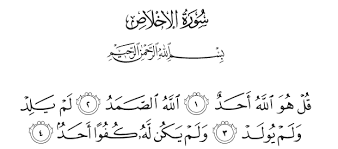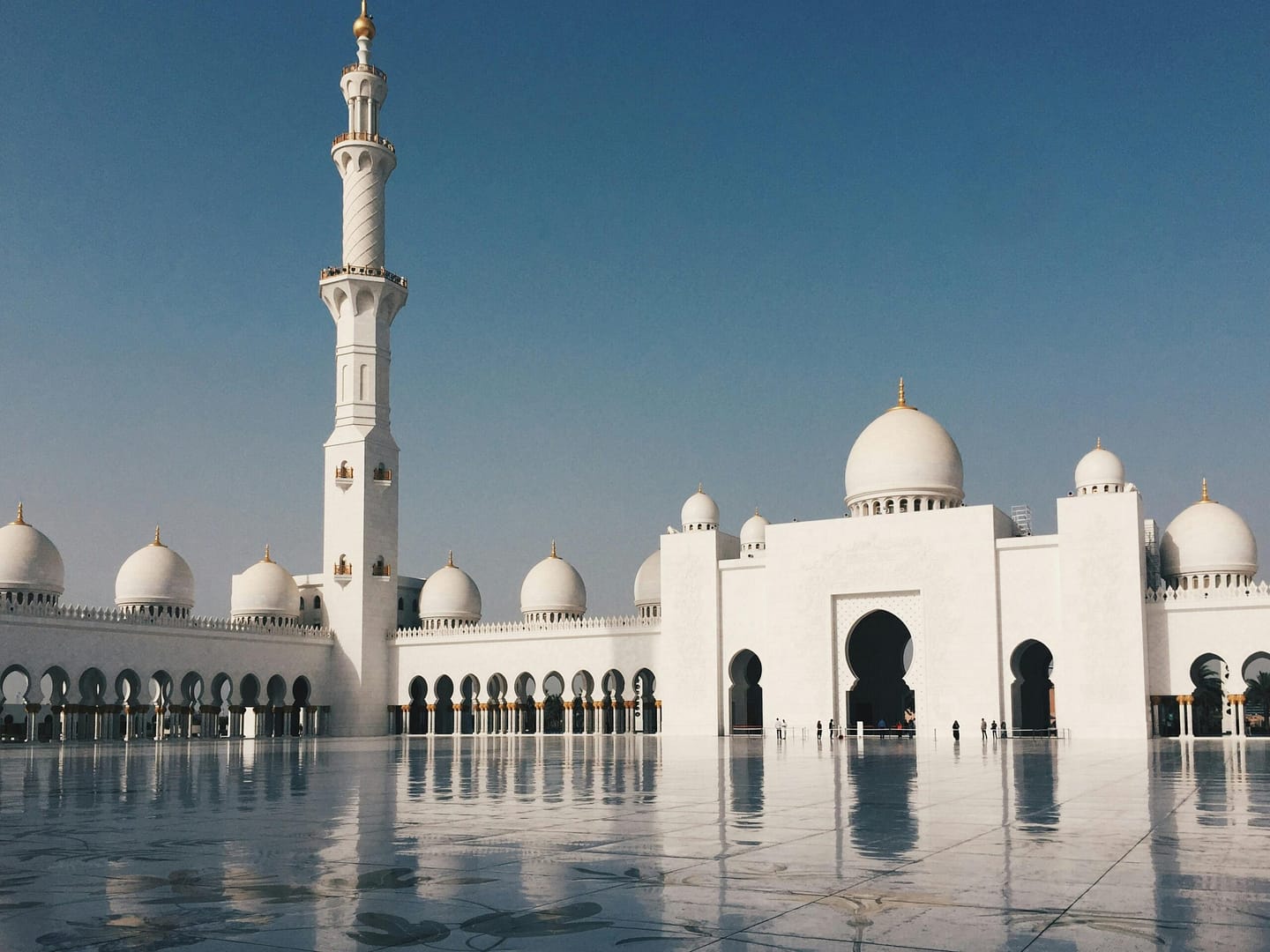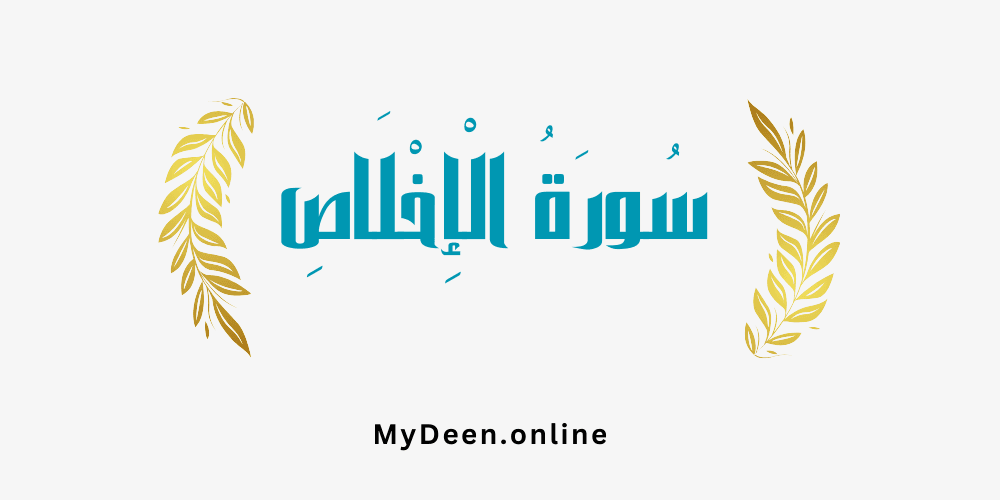Surah Al-Ikhlas
It is a Meccan surah, and it is one of the greatest surahs of the Qur’an; as it is the description of the Most Gracious.. It was named Surah Al-Ikhlas because it is pure in describing Allah the Almighty and there is no one else in it, or it is pure in the pure monotheism of Allah the Almighty, or because it saves its reciter from polytheism and Hell.
Surah Al-Ikhlas..
Glory be to the tongue that reads it and recites it, and glory be to the heart that contemplates it, learns it and knows its meaning, and glory be to the person who loves it and is certain of what is in it and acts according to it.
Surah Al-Ikhlas
Four verses, but they are extremely concise and miraculous, few in structure but great in meaning, subtle in secrets, summarizing and beautifying the origin of belief and monotheism which is the spirit of Islam and the core of the Qur’an.
Surah Al-Ikhlas
Whoever recites it, his heart will be purified, and his mind will be freed from every illusion in knowing the essence of Allah and His attributes; and he will be freed from attachment to anything other than the One and Only.

The verses of Surat Al-Ikhlas are interpreted as follows:
● (Say, He is Allah, the One): When the polytheists asked the Messenger of Allah, may Allah bless him and grant him peace, about the lineage of Allah, the Almighty, and who created Him, Allah, the Almighty, revealed this Surah. The meaning of (Say, He is Allah, the One): Say, O Muhammad, a decisive and emphatic statement that Allah, the Almighty, is One, Unique in the attributes of perfection and majesty, and He has the best names and highest attributes.
● (Allah, the Self-Sufficient): That is, the One to whom the creatures turn in their needs and questions. Self-Sufficient is one of the names of Allah, the Almighty, which shows the need of the creatures for Him, that is, He, the Almighty, is the One to whom the creatures need and He does not need anyone, and His creatures are not independent of Him, and He is independent of the worlds.
● (He neither begets nor is begotten): meaning He has no son, so He is not a father, nor was He begotten, so He is not a son. These are two attributes of deficiency, and it is not befitting for the status of the Lord of the servants – the Almighty – to be described with these attributes that diminish Him.
● (And there is none comparable to Him): meaning that God – the Almighty – is not equal to anyone in status; He has no likeness or equal, nor is He a peer or equal, as monotheism is the most important principle that Islam calls for.
The Many Virtues of Surah Al-Ikhlas
Whoever wishes to be loved by the Most Merciful, to enter the Gardens of Pleasure, to be protected from Satan, and to increase in guidance and faith, should recite Surah Al-Ikhlas (“Say: He is Allah, [who is] One”) frequently.
The Prophet (peace and blessings be upon him) praised its virtues, exalted its status, and emphasized its immense reward.
He (peace be upon him) used to recite it often, especially in his prayers. He would begin his day with it in the Fajr Sunnah prayer, start his night with it in the Maghrib Sunnah prayer, and end his day and night with it in the Witr prayer.
He would recite it at the beginning of the day in the morning supplications, at the end of the day in the evening supplications, after prayers, in the two rak’ahs of the Sunnah of Tawaf, and before sleep along with the other protective surahs (Al-Mu’awwidhat).
Some of the virtues of this great Surah:
It is equivalent to one-third of the Quran:
- The Prophet (peace and blessings be upon him) once said to his companions, “Gather together, for I will recite to you one-third of the Quran.” When they gathered, he recited to them, “Say: He is Allah, [who is] One.” They asked him about this, and he said, “Indeed, it is equivalent to one-third of the Quran” (Muslim).
- The Prophet (peace and blessings be upon him) also said, “Is any of you unable to recite one-third of the Quran in a night?” They said, “How can one recite one-third of the Quran?” He replied, “’Say: He is Allah, [who is] One’ is equivalent to one-third of the Quran” (Muslim and Bukhari).
- In a narration from Abu Hurairah, the Prophet (peace and blessings be upon him) heard a man reciting this Surah and said, “It has become obligatory.” Abu Hurairah asked, “What has become obligatory?” He replied, “Paradise” (Muslim).
Scholars explain that the Quran revolves around three main themes: stories, laws, and monotheism. This Surah summarizes the message of monotheism.
Supplicating with its content is to invoke Allah by His Greatest Name:
- The Prophet (peace and blessings be upon him) heard a servant reciting this Surah in his prayer and said, “This servant has believed in his Lord” (Ahmad, authenticated by Al-Albani).
- He also heard a man supplicating with the words, “O Allah, I ask You by the fact that I testify that You are Allah, there is no god but You, the One, the Eternal Refuge, who neither begets nor is born, and there is none comparable to Him.” The Prophet (peace and blessings be upon him) said, “By the One in Whose hand is my soul, he has asked Allah by His Greatest Name, which, if He is called upon with it, He responds, and if He is asked by it, He grants” (Abu Dawood).
- The Prophet (peace and blessings be upon him) heard another man testifying with the words, “O Allah, I ask You, O Allah, the One, the Eternal Refuge, who neither begets nor is born, and there is none comparable to Him, to forgive my sins, for You are the Forgiving, the Merciful.” The Prophet (peace and blessings be upon him) said, “He has been forgiven” (Abu Dawood).
Loving this Surah leads to Allah’s love and entry into Paradise:
The companions recognized its virtue and reward, and they loved it and were devoted to it. This is evident in the story of the man whom the Prophet (peace and blessings be upon him) sent on a military expedition. He would lead his companions in prayer and always conclude with Surah Al-Ikhlas. When they returned, they mentioned this to the Prophet (peace and blessings be upon him), who asked them to inquire why he did so. The man replied, “Because it describes the Most Merciful, and I love to recite it.” The Prophet (peace and blessings be upon him) said, “Inform him that Allah loves him” (Bukhari and Muslim).
In another story, a companion used to lead the people in prayer in the Quba mosque and would start every rak’ah with Surah Al-Ikhlas after reciting Al-Fatiha, followed by another surah. The people complained to the Prophet (peace and blessings be upon him), and he asked the man, “What prevents you from doing what your companions ask? What makes you recite this surah in every rak’ah?” The man replied, “O Messenger of Allah, I love it.” The Prophet (peace and blessings be upon him) said, “Your love for it has earned you entry into Paradise.”
A Palace in Paradise:
It is narrated by Mu’adh bin Anas Al-Juhani (may Allah be pleased with him) that the Prophet (peace and blessings be upon him) said, “Whoever recites ‘Say: He is Allah, [who is] One’ ten times, Allah will build for him a palace in Paradise.” Umar bin Al-Khattab (may Allah be pleased with him) said, “O Messenger of Allah, then we will increase (our recitation)!” The Prophet (peace and blessings be upon him) replied, “Allah is more and better (in reward)” (Ahmad).
A Fortress from Satan and Protection from Harm:
In Sunan Abi Dawood and An-Nasa’i, it is reported that the Prophet (peace and blessings be upon him) said to Abdullah bin Khubaib, “Say: ‘Say: He is Allah, [who is] One’ and the Mu’awwidhatayn (Al-Falaq and An-Naas) in the evening and in the morning three times; they will suffice you from everything.” Al-Tibi said, “They will protect you from all harm.”
The Prophet (peace and blessings be upon him) would recite this Surah and the Mu’awwidhatayn, blow into his hands, and wipe his face, head, and whatever he could of his body before sleeping.
He also said to Uqbah bin Amir Al-Juhani regarding these three surahs: “No one has sought protection with anything like them, or no one has sought protection with anything better than them.”
Surah Al-Ikhlas is a short chapter that takes only a brief moment to recite, yet it carries immense virtues, great rewards, and abundant blessings. We should recite it frequently and regularly, and not neglect it. Whoever does more, Allah is even more generous.
At My Deen Institute, we offer comprehensive courses on Quran Tafseer to deepen your understanding of the Quran’s meanings and messages. Enroll now.


